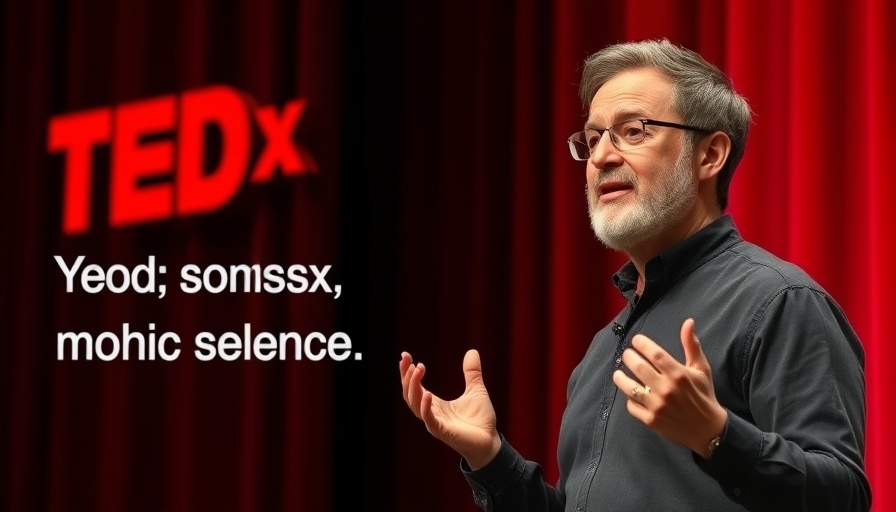
The Forgotten Links Between Religion and Diet Culture
In our quest for self-acceptance and body positivity, many of us grapple with a profoundly cultural and historical dilemma: our relationships with food. In her thought-provoking TEDx talk titled The Religious Roots of Diet Culture, Sophia Day illuminates the profound intersections between religious practices and modern-day diet culture, revealing a narrative that stretches back centuries.
In 'The Religious Roots of Diet Culture', Sophia Day presents an enlightening exploration of how ancient religious philosophies intertwine with our contemporary perceptions of food and body image, prompting a deeper investigation into the origins and implications of these societal trends.
Unpacking Normative Discontent
In the United States, over 70% of women report experiencing dissatisfaction with their bodies, a phenomenon that Sophia coined as 'normative discontent.' This isn’t solely a contemporary issue rooted in the advertising and diet industries. Rather, the ancient influence of religious philosophy shapes our modern constructs of beauty and worth, leading to a complicated relationship with food. Day argues that these challenges are not simply new, but are wrapped in a long history of religious contexts that continue to affect women’s self-image and body relations.
Food: A Vehicle for Identity
The significance of food extends beyond mere sustenance; it is a reflection of our identity, values, and beliefs. Ancient civilizations understood food as a distinct marker of social status, a concept that persists today. Christians, for instance, appropriated existing beliefs around food to carve their unique identity—a practice that contextualized what was considered moderate or indulgent. This strategic positioning of food as a marker of morality further entrenched the idea that our eating habits are tied to worthiness—both in life and in death.
The Role of Asceticism in Food Culture
In exploring the role of asceticism—a philosophical principle prioritizing renunciation of bodily pleasures—Day traces its implications to our current narratives around food. Ascetic practices have historically required that adherents strive for moral superiority through bodily control and renunciation, especially in women's experiences. This mindset leads to harmful dieting, a quest for control, and a seemingly endless cycle of self-judgment. Understanding the ascetic roots highlights why many women feel pressured to engage in food practices that perpetuate this cycle of dissatisfaction.
Why the Spotlight on Women?
Day emphasizes that while men also contend with diet culture, the onus falls more heavily on women historically and culturally. Traditions and iconography frequently depict women as central to the narratives around food—whether preparing meals or as subjects within moralistic tales about indulgence. This tradition affects contemporary perceptions, perpetuating a societal expectation that women should adhere to specific dietary ideals.
Reclaiming Control and Finding Freedom
Amid the haze of these historical complexities, Day offers a path toward healing and reclaiming one’s relationship with food. It involves three proactive steps:
- Acknowledgment: Recognize the structural influences that have shaped our attitudes towards food and the body.
- Connection: Contextualize personal struggles within a broader historical narrative to foster understanding and empathy.
- Design Your Path: Craft individual 'how might we' statements that facilitate a personalized approach to nurturing a healthier relationship with food.
Building a Future Away from Diet Culture
Creating a healthier relationship with food involves moving away from preconceived notions of body image and striving for authenticity rather than perfection. By acknowledging our cultural and historical baggage, we can focus on innovation—finding joy and connection in our dietary choices instead of anxiety and restriction. This paradigm shift can empower individuals to embrace inclusivity, diversity, and personal integrity in the pursuit of wellness.
For example, the phenomenon of 'girl dinner,' a concept that describes the informal and often disjointed meals that single women create for themselves, exemplifies a reclaiming of food autonomy. By rejecting traditional cooking standards, women find empowerment in simplicity and personal preferences, shifting from a narrative of control to one of freedom.
Moving Forward with Intent
As we confront the deeply embedded roots of diet culture, a collective responsibility emerges. It's not only about rejecting harmful patterns, but also about inspiring change and exploring new paradigms for health and well-being. The interplay of religion and culture underpins dieting practices, and recognizing this can catalyze innovative approaches in both personal and societal contexts.
Ultimately, Sophia Day's insights compel us to rethink the way we perceive food and our bodies. Through a lens of history and personal agency, we can foster a healthier dialogue about food, dispel harmful myths, and create richer, more inclusive narratives that promote not just survival, but joy and creativity in how we nourish ourselves.
 Add Row
Add Row  Add
Add 




Write A Comment